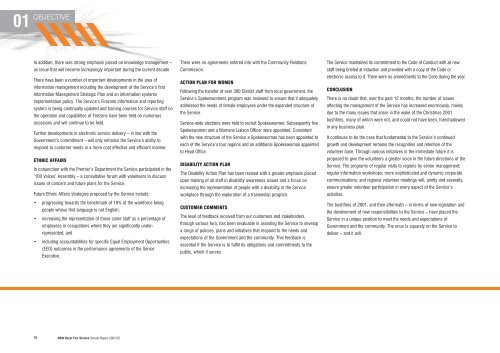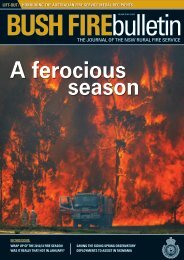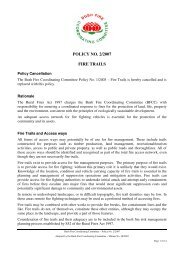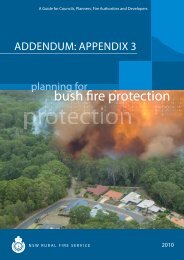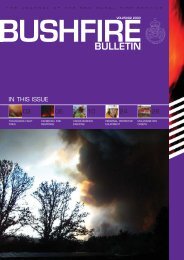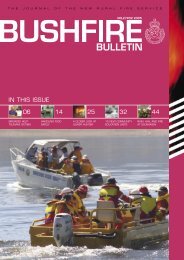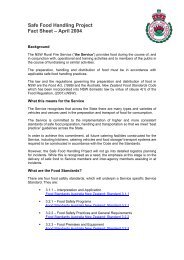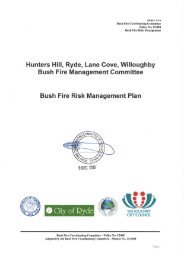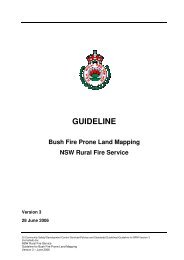Volunteer Professionals - NSW Rural Fire Service - NSW Government
Volunteer Professionals - NSW Rural Fire Service - NSW Government
Volunteer Professionals - NSW Rural Fire Service - NSW Government
Create successful ePaper yourself
Turn your PDF publications into a flip-book with our unique Google optimized e-Paper software.
01 OBJECTIVE<br />
In addition, there was strong emphasis placed on knowledge management –<br />
an issue that will become increasingly important during the current decade.<br />
There have been a number of important developments in the area of<br />
information management including the development of the <strong>Service</strong>’s first<br />
Information Management Strategic Plan and an information systems<br />
implementation policy. The <strong>Service</strong>’s <strong>Fire</strong>zone information and reporting<br />
system is being continually updated and training courses for <strong>Service</strong> staff on<br />
the operation and capabilities of <strong>Fire</strong>zone have been held on numerous<br />
occasions and will continue to be held.<br />
Further developments in electronic service delivery – in line with the<br />
<strong>Government</strong>’s commitment – will only enhance the <strong>Service</strong>’s ability to<br />
respond to customer needs in a more cost effective and efficient manner.<br />
ETHNIC AFFAIRS<br />
In conjunction with the Premier’s Department the <strong>Service</strong> participated in the<br />
‘100 Voices’ Assembly – a consultative forum with volunteers to discuss<br />
issues of concern and future plans for the <strong>Service</strong>.<br />
Future Ethnic Affairs strategies proposed by the <strong>Service</strong> include:<br />
• progressing towards the benchmark of 18% of the workforce being<br />
people whose first language is not English;<br />
• increasing the representation of those same staff as a percentage of<br />
employees in occupations where they are significantly underrepresented;<br />
and<br />
• including accountabilities for specific Equal Employment Opportunities<br />
(EEO) outcomes in the performance agreements of the Senior<br />
Executive.<br />
There were no agreements entered into with the Community Relations<br />
Commission.<br />
ACTION PLAN FOR WOMEN<br />
Following the transfer of over 300 District staff from local government, the<br />
<strong>Service</strong>’s Spokeswomens program was reviewed to ensure that it adequately<br />
addressed the needs of female employees under the expanded structure of<br />
the <strong>Service</strong>.<br />
<strong>Service</strong>-wide elections were held to recruit Spokeswomen. Subsequently five<br />
Spokeswomen and a Womens Liaison Officer were appointed. Consistent<br />
with the new structure of the <strong>Service</strong> a Spokeswoman has been appointed to<br />
each of the <strong>Service</strong>’s four regions and an additional Spokeswoman appointed<br />
to Head Office.<br />
DISABILITY ACTION PLAN<br />
The Disability Action Plan has been revised with a greater emphasis placed<br />
upon training of all staff in disability awareness issues and a focus on<br />
increasing the representation of people with a disability in the <strong>Service</strong><br />
workplace through the exploration of a traineeship program.<br />
CUSTOMER COMMENTS<br />
The level of feedback received from our customers and stakeholders,<br />
through various fora, has been invaluable in assisting the <strong>Service</strong> to develop<br />
a range of policies, plans and initiatives that respond to the needs and<br />
expectations of the <strong>Government</strong> and the community. This feedback is<br />
essential if the <strong>Service</strong> is to fulfill its obligations and commitments to the<br />
public, which it serves.<br />
The <strong>Service</strong> maintained its commitment to the Code of Conduct with all new<br />
staff being briefed at induction and provided with a copy of the Code or<br />
electronic access to it. There were no amendments to the Code during the year.<br />
CONCLUSION<br />
There is no doubt that, over the past 12 months, the number of issues<br />
affecting the management of the <strong>Service</strong> has increased enormously, mainly<br />
due to the many issues that arose in the wake of the Christmas 2001<br />
bushfires, many of which were not, and could not have been, foreshadowed<br />
in any business plan.<br />
It continues to be the case that fundamental to the <strong>Service</strong>’s continued<br />
growth and development remains the recognition and retention of the<br />
volunteer base. Through various initiatives in the immediate future it is<br />
proposed to give the volunteers a greater voice in the future directions of the<br />
<strong>Service</strong>. The programs of regular visits to regions by senior management;<br />
regular information workshops; more sophisticated and dynamic corporate<br />
communications; and regional volunteer meetings will, jointly and severally,<br />
ensure greater volunteer participation in every aspect of the <strong>Service</strong>’s<br />
activities.<br />
The bushfires of 2001, and their aftermath – in terms of new legislation and<br />
the devolvement of new responsibilities to the <strong>Service</strong> – have placed the<br />
<strong>Service</strong> in a unique position to meet the needs and expectations of<br />
<strong>Government</strong> and the community. The onus is squarely on the <strong>Service</strong> to<br />
deliver – and it will.<br />
10<br />
<strong>NSW</strong> <strong>Rural</strong> <strong>Fire</strong> <strong>Service</strong> Annual Report 2001/02


